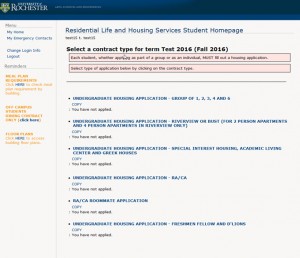Residential Life will now, for the first time, allow students to complete the room selection process online when they select housing for the 2013-14 academic year later this month. This marks the discontinuation of the lottery system used previously in which students were required to attend room draw sessions to choose housing.
“This is a new and really different kind of thing,” Director of Residential Life Laurel Contomanolis said.
Director of Dining Services and Auxiliary Operations Cam Schauf, who was a part of the initial Lottery Task Force that discussed the possibilities for a new system, is optimistic about the change.
“I think potentially it’s great,” he said, but added that he is “a little nervous,” simply because the system is brand new.
One of the key parts of this novel system is that it will take place entirely online, from start to finish — the process can be completed wherever there is Internet access (including foreign countries, if students are studying abroad) which, according to Contomanolis, means that it will be less time-intensive for students and staff alike.
So how does it work?
Each student will first need to fill out a housing contract (regardless of whether they plan to have a roommate or not) which opens on March 22.
There are six contract types, and although everyone will be required to fill one out, only those who select the regular undergraduate housing or “Riverview or Bust” contracts will participate in the online room selection process.
On April 12, instead of a lottery number, students will receive a selection date and time via email which will delineate when they can log onto the system to choose their rooms. Similar to registering for classes, students will not be allowed to log on before that time, but will be able to continue to log on after the time has passed.
The room selection process itself will take place from April 15 to19, from 9 a.m. to 5 p.m. each day. Students will log on at two-minute intervals (each possible time is allocated to two students) which, Cotomanolis explained, will eliminate the possibility of a “free-for-all” at any particular time. Floor plans and meal plan guidelines will be accessible directly from the room selection system.
Students will be able to choose from any available housing when they make a selection as long as they have the right number of people — every student will designate their roommates or suitemates on their contract, and each of those students must confirm the arrangement on their own account.
The only exception is double rooms — students without a designated roommate may select a double room, essentially setting themselves up to receive a random roommate.
The sign-on times will be assigned based on class year and students will be able to select housing at the earliest time a member of their suite or room has been given.
Contomanolis noted that she believes the new system seems fairly intuitive and is hopeful that others will think so as well.
An online system was first seriously considered starting in the fall 2011 semester, during which the Lottery Task Force — a group comprised of Contomanolis, Schauf, the chairs of the Students’ Association Projects & Services Committee, several other SA senators, Residential Life area coordinators, and technological staff began meeting to discuss what students wanted and needed from a new system.
“One of the things that we really tried to do from the very beginning was to take an open look and not take anything for granted,” Schauf said.
The committee started from a blank slate, according to senior Shiv Rambarran, who served as the SA Residential Life Aide during the 2011-12 academic year and was a part of the Lottery Task Force, focusing first on what an ideal system would be and then determining what would and would not be feasible.
“It’s meant to be more convenient for students,” Rambarran said.
Sophomore Jamie Strampe sees the new system as a positive step forward.
“I don’t know if this will work any better, but I think it’s good that they’re looking into new ways to do it,” she said.
Junior Ben Wainblat is a bit more apprehensive.
“It’s a different approach, I suppose,” he said, expressing concerns that he believes it seems like there’s a lot of opportunities for things to go wrong.
Contomanolis hopes the selection process will go off without a hitch but noted that there are provisions in place, such as the ability to reset the system, in case something goes wrong.
“Do I expect that there might be a glitch or two? Probably,” she said. “But I don’t think there’s anything that’s going to be insurmountable.”
Ultimately though, Contomanolis is confident in the new system.
“We think it’s pretty slick,” she said.
Goldin is a member of the class of 2013.


